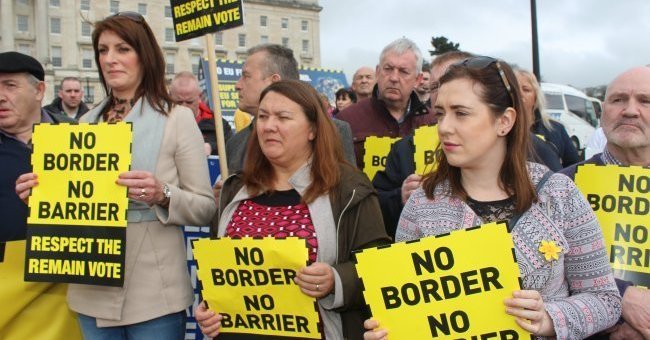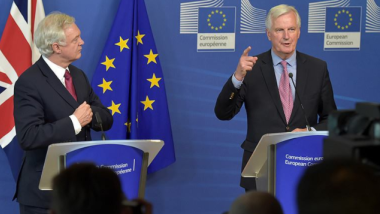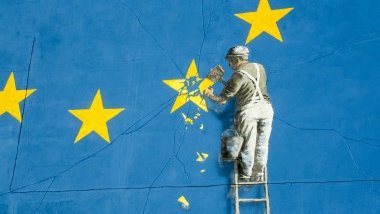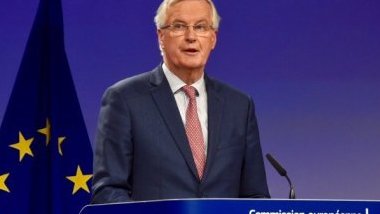When voting on Brexit, in addition to the inherent monetary and economic issues linked to a negotiated exit of the United Kingdom from the European Union, the Irish issue quickly became a central concern. Fears that were scarcely erased after the signature of the Good Friday Agreement in 1998 came back with the concern of the return of a border between the two Irelands. In addition, 2017 was a particularly chaotic year from a political standpoint, as the coalition displayed divisions against the backdrop of various scandals.
An island separated again?
The thorny issue of the Brexit divorce bill being almost resolved, another issue is now blocking talks: the fate of Northern Ireland. Theresa May is juggling between the will to reassure Dublin, the European Commission, and also (and above all) the DUP (the Democratic Unionist Party which allows her to have a short majority in Parliament). The situation looks more and more like a tricky balancing act where nobody seems capable of predicting the outcome.
Because, with the exit of the United Kingdom from the European Union, the greatest fear of the Irish, especially in the South, would be the return of a physical border between the two Irelands. Since the Good Friday Agreement, but also and above all in virtue of the United Kingdom’s membership to the European single market, the trade between two parts of the island has been intense. Theresa May has promised to do anything to avoid the return of the border, but the return of customs duties and thus physical controls would constitute a filter that was so far nonexistent.
Despite this goodwill demonstrated by Theresa May and materialized in an almost finalized agreement on the issue with Jean-Claude Junker on 4th December, the DUP keeps on getting on the nerves of the British Prime Minister and of her European counterparts. Called to the rescue by Theresa May in the last legislative elections to allow her to reach the majority in Parliament, this Unionist party – which counts only ten MEPs – strongly opposes the perspective yet validated by all. The DUP, which had refused to sign the peace agreements, fears today that a special status agreed to Northern Ireland – allowing free trade with an EU country – could take it away from the United Kingdom.
The problem is that without the DUP, Theresa May cannot do anything and would lose her majority in the Parliament by going too far in the disagreements. The Unionist party got it well and intends to take advantage of this position to make the negotiators’ task even more complicated.
A political year that will leave its marks
If the DUP distinguishes itself in the UK, the coalition it forms with the Sinn Féin (an Irish nationalist and republican party) went through many tensions in 2017. FOOTNOTE: The rules of the coalition were established in the peace agreements of 1998
In January, Martin McGuinness of Sinn Féin resigned from his position as deputy prime minister of the local government, and his party refused to appoint a successor thereafter. This led to the resignation of Arlene Foster (the First Minister of Northern Ireland coming from DUP), who cannot rule without the republicans. McGuinness’s resignation was justified by the “Cash for ash” scandal that revealed the existence of a big scandal of renewable energy’s subsidies in which Mrs Foster is involved. Facing the numerous demands for her resignation from Sinn Féin, she didn’t give up and thus forced her counterparts in the coalition to use the most radical method.
The DUP came in first again in last March anticipated elections, though losing ground to the Republicans. Since then, the coalition negotiations have never come to a successful conclusion. Arlene Foster is once more at the centre of the debates, as the nationalists refuse to rule with her. Besides this divergence, deeper questions are causing trouble between the two factions, in particular the DUP’s radical conservatism on society questions (especially the refusal of abortion and gay marriage and the restoration of death penalty).
The two parties had until last 30th October to form a government. Otherwise, the risk of seeing London taking back control of the province, and thus damaging the agreements signed almost twenty years ago, was looming above the Parliament in Belfast. And this political crisis occurs in addition to a monetary crisis. Without a government, the province is not capable of presenting a budget for next year. London will thus take this on. If the parties have guaranteed that this will not call into question the sharing of competencies established in 1998, the symbolic value is strong.
Between Brexit and the essential formation of a government, the next months are going to be chaotic for Nothern Ireland, almost twenty years after having historically ratified the will of being a pacified province.
This article was first published in Eurosorbonne.








Follow the comments: |
|
